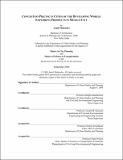Congestion pricing in cities of the developing world : exploring prospects in Mexico City
Author(s)
Mahendra, Anjali, 1977-
DownloadFull printable version (2.470Mb)
Other Contributors
Massachusetts Institute of Technology. Dept. of Urban Studies and Planning.
Advisor
Ralph Gakenheimer and Joseph M. Sussman.
Terms of use
Metadata
Show full item recordAbstract
(cont.) academics, researchers, and practitioners interested in improving transportation and air quality in the region. The survey shows that there is hesitation in considering any such policy in the MCMA without prior improvements in public transport. In light of these findings, we have outlined the complicated issues surrounding implementation, with recommendations for a course of action given the current policy agenda. The findings presented in this thesis can be used by decision makers in Mexico City to design a set of policies for improving mobility, with a better understanding of the issues surrounding congestion pricing. Car ownership in many large cities of the developing world is rapidly increasing with rising incomes, and is accompanied by traffic gridlock, travel delays, and deteriorating air quality. The policy of congestion pricing to manage growing travel demand has been implemented with varying degrees of success in some developed countries. This thesis explores the applicability of congestion pricing in the Mexico City Metropolitan Area (MCMA). Current transportation policies in the MCMA were studied, with an analysis of the factors causing increased demand for private transport. Of the many forms in which congestion pricing may be implemented, we focused on the possibility of a central city congestion zone similar to that recently implemented in the city of London, providing arguments for its viability, and preliminary analyses regarding potential impacts. We studied how household level car ownership had changed for different income groups in Mexico City between 1994 and 2000, in order to make empirical estimates of the distributional impacts that a congestion pricing scheme might have. Our results show that the location of low income car owning households far from the central areas, and their limited access to efficient public transport creates negative consequences for them. Yet, significant overall reductions in traffic and travel time savings are possible with a congestion charge. Lower income people can benefit if the revenues from congestion pricing are used to improve their accessibility to public transport. Congestion pricing is difficult to implement, especially given the decentralization and overlapping levels of political authority in the MCMA. As part of this research, we surveyed various Mexican government officials,
Description
Thesis (M.C.P.)--Massachusetts Institute of Technology, Dept. of Urban Studies and Planning; and, (S.M. in Transportation)--Massachusetts Institute of Technology, Dept. of Civil and Environmental Engineering, 2004. This electronic version was submitted by the student author. The certified thesis is available in the Institute Archives and Special Collections. Includes bibliographical references (leaves 137-143).
Date issued
2004Department
Massachusetts Institute of Technology. Department of Civil and Environmental Engineering; Massachusetts Institute of Technology. Department of Urban Studies and PlanningPublisher
Massachusetts Institute of Technology
Keywords
Civil and Environmental Engineering., Urban Studies and Planning.